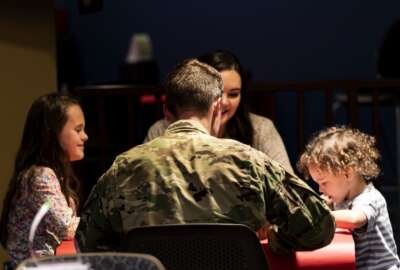Military spouse unemployment hovers around 25% — which can lead to financial issues for families and to frustrated partners who are trying to thrive in their career.
One of the biggest issues for spouses when they move with their military partners is occupational licensing. According to the National Conference of State Legislatures, one in four occupations now require state licenses. That causes a hefty barrier to entry for spouses who have to move every two or three years.
The annual percentage of the military spouse population that moves across state lines is 14.5% — compared to 1.1% for civilian spouses. As much as 34% of military spouses in the labor force are required to be fully licensed — and of those spouses, 19% experience challenges maintaining their licenses, according to the Defense Department.
Now, DoD is teaming up with the Council of State Governments in hopes of creating more interstate compacts to make it easier for military spouses to get new licenses or have their old licenses transfer after moving.
This year, DoD is providing grants up to $1 million to professional organizations that want to create reciprocity on career licensing between states, but may not have the resources to work with states on legislation.
“What the agreement with the Department of Defense allows us to do is work with these professions to convene a technical assistance group that will make recommendations about the provisions of the compact, convene a team to draft the compact and work with the professions to socialize the document through a robust stakeholder review process,” Dan Logsdon, director of the Council of State Government’s National Center for Interstate Compacts told Federal News Network.
The compacts must be approved by state legislatures and signed into law by governors.
DoD will be working with five professions through the grant program this year: teaching, social work, cosmetology, massage therapy, and dentistry/dental hygiene.
“The authorization from Congress allows us to do this through 2024,” said the director of DoD’s Defense-State Liaison Office, Marcus Beauregard. “We’ve gone through the first process of applications and we had a very open process. The Council of State Governments did a superb job of contacting all the associations to make sure that the word was out there that we were providing this opportunity, and then guided interested professions through the process with a webinar.”
From there, the Council of State Governments put out a request for proposals.
“We then reviewed their proposals that came in February, and made the selection based on how strong their business application appeared to be,” Beauregard said.
The states already have a handful of broad compacts in place for military spouses for nursing, physical therapy, emergency medical technicians, psychologies, speech pathologies, occupational therapists, doctors and counseling.
Logsdon said the process won’t be easy for these new compacts.
“If there’s a more heavily regulated profession than the teaching profession, I’ve yet to come upon it,” he said. “That compact is going to be a very challenging one, but it’s one that the profession is willing to take on. We’ve got great partners there that we’re going to be working with to facilitate that process.”
Logsdon said one of the reasons states have licenses is to protect the public and revoke them when needed.
“You want to ensure that you have qualified personnel out there in these professions,” he said. “One way to do that is through occupational licensure. The vast majority of states put a lot of time and effort and thought into how they regulate these professions. One quirk of our federalist system is that states have sovereignty over how they want to regulate a profession. What an interstate compact does is it preserves the state’s authority. We find the uniformity in licensure compacts. We find a uniformity in how the states regulate or might regulate a profession and we are able to create an agreement that everyone, or at least the vast majority, of states are willing to sign on to.”
DoD and Congress are also working with spouses in other ways to ease certification burdens by providing licensure fee waivers or reimbursement.
Copyright
© 2024 Federal News Network. All rights reserved. This website is not intended for users located within the European Economic Area.

